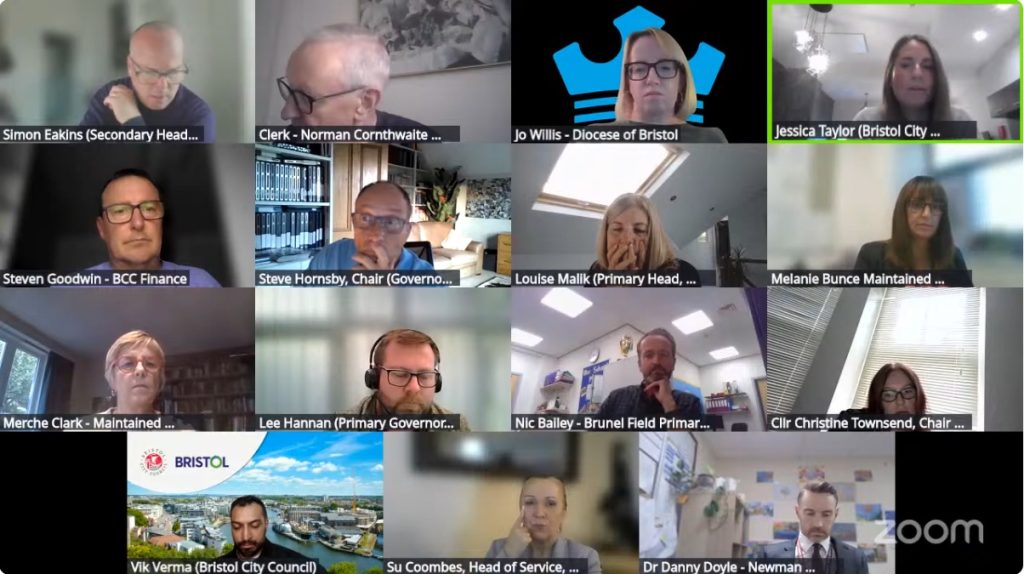Bristol Send School Places: School Organisation Strategy Update
Post-16 Transport looks to be ongoing headache for Bristol families
An update on the city’s School Organisation Strategy was given at Bristol Schools Forum this week.
Nestled at the end of the meeting was a mention of Home To School Transport for young people attending post-16 placements.
Cuts to the service for these young people came into force at the start of the academic year.
‘The Bulge’
The Forum was given an overall update on the Bristol’s School Organisation Strategy, presented by Jessica Taylor of Bristol City Council.
The update reported that the number of births in Bristol rose from 6,170 in the academic year 2008/2009 to 6,832 in the academic year 2011/2012. This was seen in the higher primary school intakes between 2013 and 2016. It’s been known in Bristol as ‘the bulge’.
The number of births has now dropped – by 27 per cent since 2011/12. There are now lower pupils numbers causing primary schools issues with falling rolls.
At the same time as ‘the bulge’ the number of pupils with Special Educational Needs and Disabilities (Send) also increased. This has been characterised in Bristol in both its politics and by council officers with the words ‘unprecedented demand’.
The ‘growing demand’ for Send is noted in the ‘ key aims’ of the School Organisational Strategy.
‘Significant Increase in Demand’
In a section dedicated to Bristol Send statistics, the presentation data found there had been a ‘significant increase in demand for SEND services at both national and local level.’
It said that the number of children and young people in Bristol with an Education Health Care Plan (EHCP) had increased by 18 per cent between 2023 and 2024. Nationally, there had only been an increase of 11 per cent.
The report also said: ‘It is anticipated, with mitigations, the number of EHCPs in Bristol will start to align with National averages over the next five years.’
The England national average for EHCPs in 2024/25 is 5.3 per cent of pupils. This is up nationally from 4.8 per cent in 2024.
But Bristol has always remained below the England national average, currently at 4.1 per cent for 2024/25.
The slide below says: ‘As of 2024, 70,635 children and young people are on roll in Bristol schools, 15.6% (10,944) receive SEND support and 4.1% (2,877) have an Education Health and Care Plan (EHCP). The number of children and young people with an EHCP in Bristol increased by 18% between 2023 and 2024, compared to an increase of 11% nationally.’
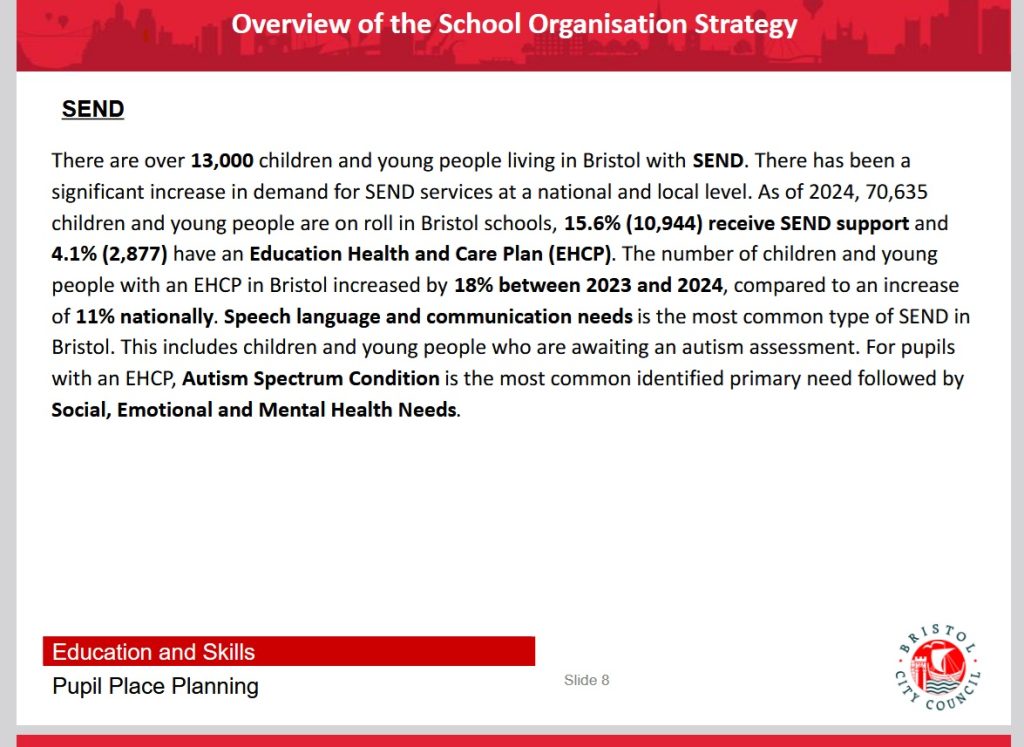
One of the big reasons for the increase of EHCPs in Bristol was the former Labour Cabinet Education lead, along with the former mayor, removing non-statutory top up funding. This caused ‘a very significant spike’ in Education Health Care Needs Assessment (EHCNA) Requests.
There are five recommendations for Send placements in the Organisation Strategy:
- Provide the right support, at the right time, in the right place for children and young people with SEND.
- Expand local SEND provision to meet the growing demand and reduce reliance on out-of- area placements.
- Promote inclusivity by strengthening mainstream schools’ capacity to support children with SEND
- Collaborate with families, schools, and health services to co-produce decisions and strategies.
- Prepare children and young people with SEND for successful transitions into adulthood
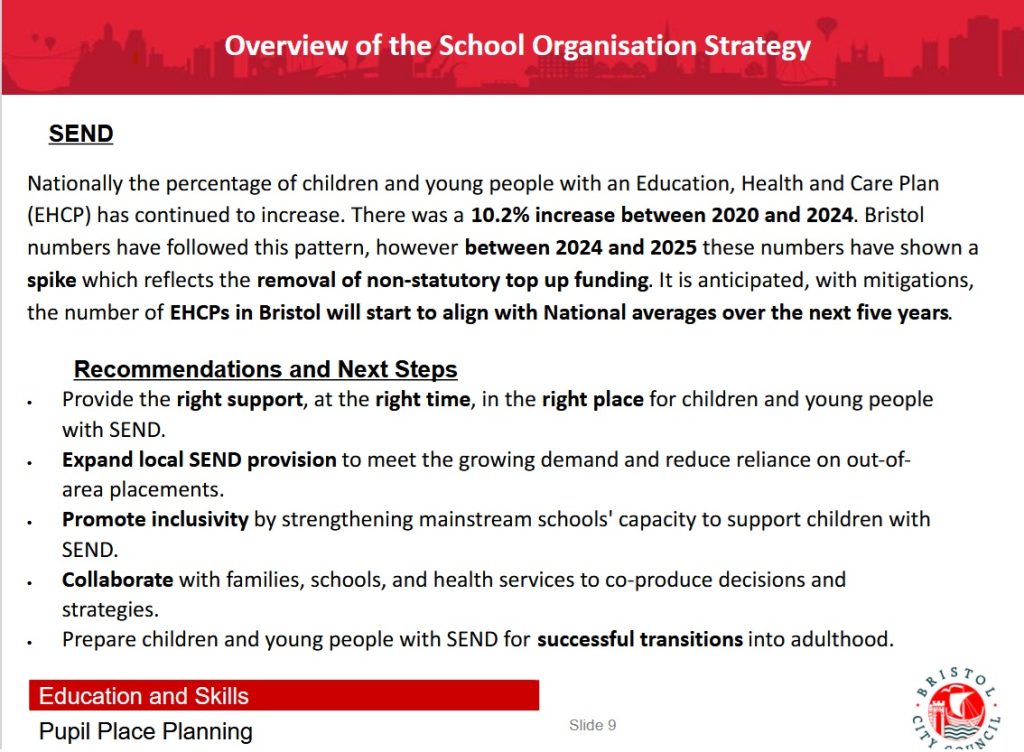
Questions About Send
Two questions were asked at Bristol Schools Forum regarding Send.
Lee Hannan for Brentry Primary School asked: “So the send numbers at 15.6 and EHCP at 4.1. And your slide suggests that with mitigations, the number of EHCPS will start to align with national averages.
“I just wonder what that what what do you mean by mitigations? What will that be? What will that entail?”
Director of Education and skills, Vik Verma said: “I think what we saw was, and I think we’ve shared this at forum before, but the withdrawal of non, and we’ve said this you know through our planning that we published, the withdrawal of non-stat top up resulted in a very significant spike in requests for assessment. Particularly because schools would have previously have sought funding from that top up pot. But then with the withdrawal of that about two years ago that meant you know, that pushed a number of requests into statutory space.
“What we have done, and I suppose the mitigations are, what we have done is launched our inclusive learning service. We have launched a early intervention fund and in fact there’s some changes that are coming through this year to increase that fund per pupil and offer some support through that.
“We’ve also increased capacity of our team. So we are still seeing quite a high number of requests for assessment but they are coming down a little bit from where we were last year.
“So we are in some ways an outlier in Bristol in that you know, it’s a unique bit of policy that was local to Bristol that caused that change. But over time we expect us to you know, Bristol to return to the national average request for assessment and then look you know, the reforms are coming potentially this autumn we’re told. We haven’t heard anything this week for example at the various conferences as to whether there’s any indications. But that could you know, bring further change to the sector that may change it whatsoever and I can’t show any detail on that because we haven’t been given any by government but you know, we are in a kind of policy reform space at the moment and we’ll see what that brings.”
Post-16 Home To School Transport
For the Diocese of Bristol, Jo Willis said: “I know that you’ve recently changed your policy around transport for post 16 children with an EHCP. Has that had any impact on your numbers of children that are not in education, training or employment?
Vik Verma said “Yeah, I’m just thinking we may have to take that one away and check that. I think it may be too early to say at this point.”
“The change I believe, only took effect in September.”
The SEND Regulations 2014 – Regulation 18 – states that an EHCP must be reviewed and amended before 31 March if a transfer is taking place from secondary school to a post-16 institution.
This means the annual review for this phase transfer should start to take place in the autumn term ahead of the academic year the child moves.
It is likely that data regarding applications for post-16 transport, along with rejections and appeals for September 2025 can already be made available.
Councillor Christine Townsend said: “So every child that needed transport had it from day one and I know that the home school transport are working, they’ve got a couple of cases that they’re still working through.
“I know there’s been some media coverage nationally around children that clearly need door-to-door transport and parents having to pay huge amounts of money or being expected to transport their their children.
“That isn’t the approach that’s been taken in Bristol. If a child needed door-to-door, it was the the first point was this needs to be council provided and then work from there upwards rather than the other way round.
“So Hannah and I have been in, particularly in the special schools, since September to sort of triangulate that off and that’s the case. Yeah. But the figures will come through.”
Children and Young People Policy Committee – of which Councillor Townsend is Chair – heard in August that ‘travel barriers’ were impacting upon the number of young people who were classed as NEET (Not in Education, Employment and Training).
An Equality Impact Assessment for a second paper on the same agenda regarding cuts to post-16 transport for children and young people with Send said that only a ‘small handful’ of young people with ‘very complex needs’ would be eligible for ‘commissioned transport’:
‘The reduction of commissioned transport for post-16 students from September 2025 is likely to affect households where a child or young person [CYP] has SEND. Reducing non-statutory support for this group could potentially also reduce the number of CYP with SEND accessing post-16 courses and reduce employment opportunities… Finally, a small handful of CYP with very complex needs will continue to be supported with commissioned transport.’
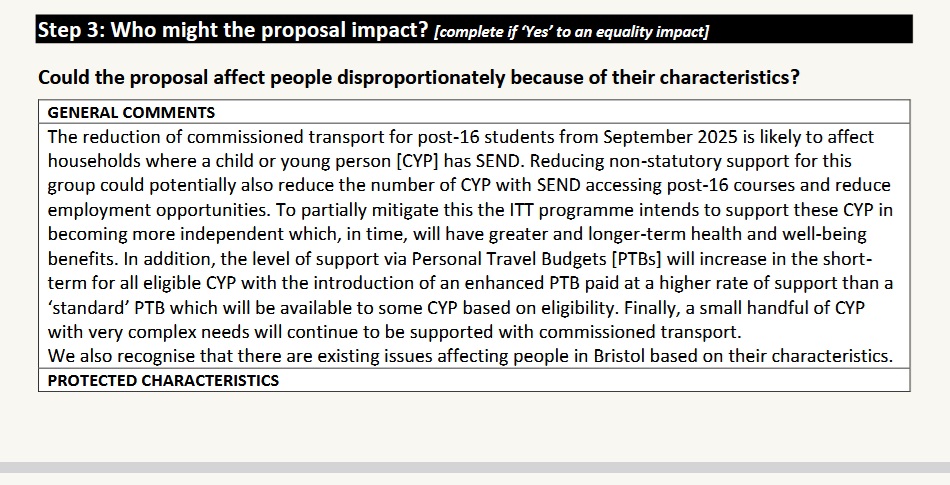
Post-16 and Home To School Transport woes for families look set to carry on for some time.
The Draft School Organisation Strategy 2025 – 2028, says: ‘The table below shows the number of pupils with EHCPs by phase of education. The data demonstrates that there will be a potential increase in young people with EHCPs in phases post 16 and post-19 over the next 5 years. Future planning will need to take this into account.’
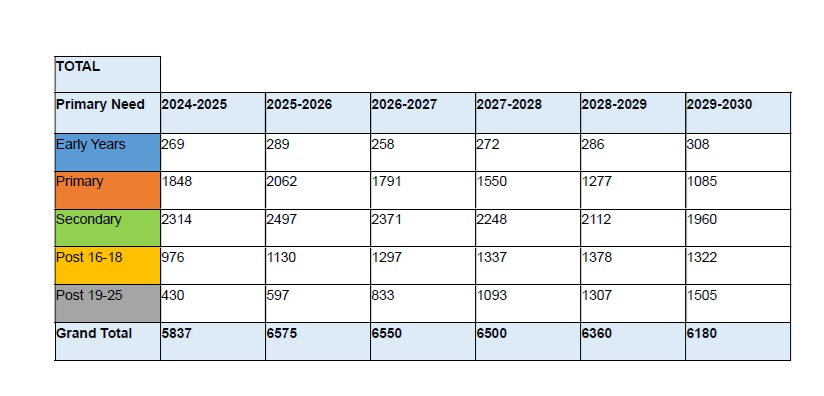
The Draft School Organisation Strategy:
We will be following up with more updates on Bristol City Council’s Home to School Transport for post-16 Send pupils in the future.
Families needing further help with Home To School Transport can find out more from Bristol Parent Carer Forum’s post-16 guide:
Home: https://backstagebristol.com/
Bluesky: https://bsky.app/profile/chopsybristol.bsky.social
TikTok: www.tiktok.com/@chopsybristoltt
Facebook: https://www.facebook.com/backstagebristol
YouTube: https://www.youtube.com/user/chopsybaby

